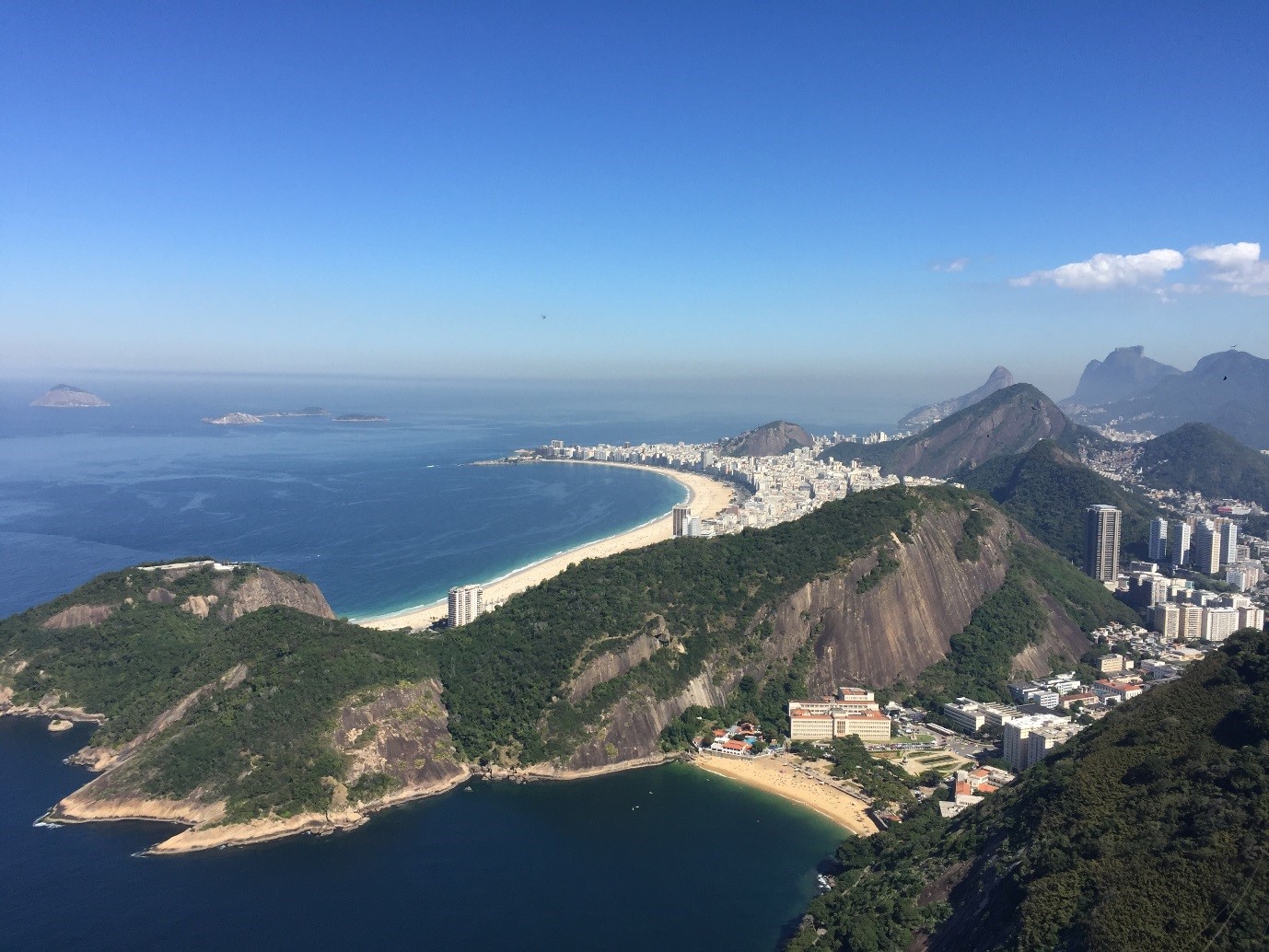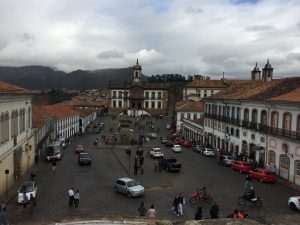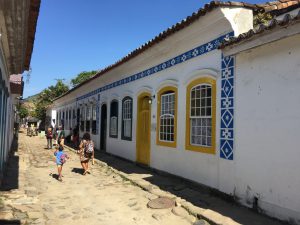
November 22, 2017, by lzzeb
ICHC and ICHST, Brazil 2017
A blog by Professor Mike Heffernan
Thanks to a Conference Grant provided by the School’s Research Committee, I was able to attend two major conferences in Brazil in July 2017 – the 27th International Conference on the History of Cartography (ICHC) and the 25th International Congress on the History of Science and Technology (ICHST). The former is a biennial event that attracts several hundred delegates. The latter is a much larger quinquennial conference involving several thousand participants.
The ICHC took place in Belo Horizonte, 450 kilometres north of Rio de Janeiro. My prior knowledge of this substantial city, which has a population in excess of five million, was pathetically meagre. All I could recall on the long flight from Heathrow were the famous World Cup football matches played at the enormous local stadium – the 1-0 victory of the United States over England in 1950 and the equally surprising 7-1 triumph of Germany over Brazil in 2014.
Belo Horizonte turns out to be a rather fine city with an impressive downtown arranged on a grid street pattern featuring several elegant parks. The climate in July is sublime – bright sunny days and cool, even chilly evenings. As if to counteract the city’s somewhat tainted sporting heritage, the venue for the ICHC was the Minas Tênis Clube, a modernist complex of swimming pools, racket courts and other arenas, including the lecture theatres and seminar rooms used for the conference. The Clube was built during the city’s re-development in the 1930s, a transformation revealed by the planning maps displayed at one of three cartographic exhibitions put together in different venues across the city, in very challenging circumstances, by Professor Junia Furtado and her fellow conference organisers from the city’s university.
After a week of excellent presentations in Belo Horizonte (by which time I’d learned that the ‘te’ is pronounced ‘ch’), I set off with a few dozen colleagues on an enjoyable post-conference field trip during which we visited the beautiful town of Ouro Preto, the wealthiest settlement in the Americas during the seventeenth-century gold rush and now a UNESCO World Heritage site famed for its baroque churches, and the network of stunning modern art galleries set in the encroaching rainforest around Inhotim. After the field trip, I headed south by bus – the only option for overland travel – to the delightful coastal resort of Paraty, possibly the most chilled-out town in Brazil (if not the world), for a few days of rest and recuperation.
My return journey to Rio was memorable for all the wrong reasons. The buses I had used previously were rather luxurious but the one I boarded in Paraty had definitely seen better days. It was also packed with passengers and luggage. As we entered the western suburbs of Rio in the early evening, one of the tyres burst spectacularly. For the next two hours, we waited for a replacement vehicle in pitch darkness on the side of a busy highway. I subsequently discovered that the adjacent area is a favela dominated by the same drug gang that shot and seriously injured an unfortunate British tourist who took a detour into the area from the main road a week later.
The only moment of levity during this otherwise tense delay came when I managed to communicate to an elderly passenger sitting behind me, using a mixture of French and poor Spanish, that the driver should perhaps stop wasting his time laying strips of vegetation on the highway to our rear in an unconvincing attempt to divert oncoming traffic from our lane and call the police instead. This idea was greeted with a gale of incredulous laughter that swept down the bus. Evidently we had come to rest in a ‘no-go’ area into which the police refuse to stray. Although the local youths – many of them incongruously flying kites in nearby streets – seemed harmless enough, a Brazilian colleague later suggested that kites are an elaborate form of urban semaphore used by gangs to communicate and to mark their territory.
The replacement bus finally arrived and I made it to my city centre hotel several hours late but in one piece. The ICHST kicked off the following afternoon in the charming if dilapidated buildings of the Federal University. Along with colleagues from France, Spain, Portugal and Brazil, I co-organised two day-long sessions at the ICHST on behalf of the International Geographical Union (IGU), one of the affiliated organisations, on ‘Geography as an International Science’.
Both conferences were excellent though very different in scale and format. Although there were parallel sessions at the ICHC in Belo Horizonte, I was able to attend every plenary session and all the papers that interested me, including several posters introduced by their authors during an afternoon set aside for this purpose. The ICHST in Rio, on the other hand, involved dozens of parallel sessions and I was only able to attend a handful of presentations outside of the two IGU sessions in which I was directly involved before departing for the UK. Several scholars from Brazil and other Latin America countries were involved in both conferences. As far as I know, I was the only non-Latin American who attended both events.
The quality of the presentations was generally high, especially from the early career academics. At the ICHC, presentations and discussions were in English. While some non-native speakers struggled with the language, most coped brilliantly. For our session in Rio, we decided that papers could be presented in the speaker’s preferred language, with translations provided by the audience where necessary during the questions. The result was a fascinating multi-lingual experience in which papers were presented in English, French, Spanish and German, with questions and discussions in each of those languages plus Portuguese. By no means every speaker used their native tongue and there were presentations in French by native Spanish and English speakers and in English by native French, German and Japanese speakers. Brazilian delegates presented in all of the above languages, including German, and only used Portuguese when explaining specific points of translation during the discussions. To provide a measure of linguistic consistency, we specified that power-point slides – which were universally deployed – should be in English.
On balance, the multi-lingual sessions in Rio were the more exciting, partly because the sessions were in a less formal setting but mainly because presenters who might otherwise have mumbled into a translated English script were free to express themselves in a language in which they were genuinely comfortable. They were therefore able to add the kind of performative and rhetorical flourishes that make for interesting presentations.
There is, I think, a lesson here as everyone, regardless of their linguistic abilities, seemed able make sufficient sense of the presentations, if only by following the power-point slides, to contribute to the extended and occasionally animated discussions. We all agreed afterwards that presentations delivered with panache and illustrated with power-point slides that use a common lingua franca generate more entertaining and challenging academic encounters. This format highlights the importance of language as a means of scholarly communication and as a substantial area of investigation in its own right.
Brazil is currently in the midst of a serious economic and political crisis, the nature of which I had only read about in newspapers. The consequences of this crisis were made clear to me by the many inspirational Brazilian colleagues I encountered in both cities, some of whom have not been paid by their universities for several months. Despite this scandalous affront to their professional integrity, these remarkable people continue, with quiet dignity and defiance, to teach their students, to conduct their research and to organise important international conferences at which foreign visitors are provided with the kind of welcome for which their country is justly renowned. For a British academic, perhaps overly concerned with ‘first-world’ problems, this was a truly humbling experience.
No comments yet, fill out a comment to be the first



Leave a Reply